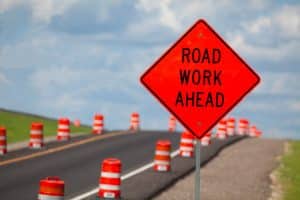The Dangers of Work Zones Can Change Day by Day
 We all want our roads to be safer. No doubt we like it when an old road gets a fresh look with new pavement. We like convenience, and we want the Department of Infrastructure to do what it’s meant to do and create driver-friendly streets, exits, ramps, and intersections. The problem that comes with that is the indeterminate amount of time that the road will be a work zone, and the daily changes that come along with it. From new signs to temporary traffic lights to detours, a work zone (while necessary) presents a host of issues to drivers on the roads. Routines are disturbed, and people are taken by surprise at new changes to the roadways.
We all want our roads to be safer. No doubt we like it when an old road gets a fresh look with new pavement. We like convenience, and we want the Department of Infrastructure to do what it’s meant to do and create driver-friendly streets, exits, ramps, and intersections. The problem that comes with that is the indeterminate amount of time that the road will be a work zone, and the daily changes that come along with it. From new signs to temporary traffic lights to detours, a work zone (while necessary) presents a host of issues to drivers on the roads. Routines are disturbed, and people are taken by surprise at new changes to the roadways.
In a road work-zone, several factors can change from day to day:
- Traffic patterns. Traffic flow and lane configurations may change as the work progresses. Lanes may be closed, shifted, or reopened to accommodate construction activities.
- Work activities. The specific tasks being carried out by construction crews can vary from day to day. For example, one day they might be excavating, and the next day they could be paving.
- Equipment and machinery. Different equipment and machinery may be in use on different days, such as bulldozers, cranes, or concrete mixers.
- Road surfaces. The condition of the road surface can change as construction progresses. Temporary surfaces, like gravel or dirt, may be in place on some days.
- Signage and traffic control. The placement of signs, cones, and barriers may change to direct traffic safely through the work-zone. This can vary depending on the phase of construction.
- Worker locations. Construction workers may be in different areas of the work zone on different days, so it’s essential for drivers to be aware of their presence.
- Weather conditions. Weather can affect construction schedules. Rain, snow, or extreme temperatures can impact the work being done and the safety measures in place.
- Detours and route changes. Depending on the project’s progress, detour routes may change, and alternative routes may be recommended for drivers.
- Work hours. Construction work may occur during different hours on different days, so drivers should be aware of potential night work or extended hours.
- Speed limits. Speed limits within the work zone may change based on the current conditions and activities. These limits are usually posted on signs.
- Temporary road markings. Temporary road markings may be added or altered to guide traffic through the work zone safely.
Given these potential daily changes, it’s crucial for drivers to stay attentive, follow posted signs and instructions, and be prepared for different conditions when traveling through roadwork zones. Safety measures and regulations are put in place to protect both drivers and construction workers.
How do changing work zones make driving more dangerous?
Changes in work zones can be dangerous for drivers for several reasons:
- Confusion. Rapid changes in traffic patterns, lane configurations, and detours can confuse drivers, leading to uncertainty about the correct route to follow.
- Reduced visibility. Work-zone changes may result in reduced visibility due to barriers, equipment, or construction materials, making it harder for drivers to see the road ahead and potential hazards.
- Sudden stops or slowdowns. Drivers may encounter sudden stops or slowdowns as they approach a changed work-zone configuration. This can lead to rear-end collisions if drivers do not react quickly enough.
- Lane merging. Changes often involve lane merging or shifting, which can lead to conflicts between vehicles and increase the risk of sideswipes or collisions.
- Narrowed lanes. Temporary lane narrowing can reduce the space available for vehicles, making it challenging for drivers to maneuver safely, particularly for larger vehicles like trucks or buses.
- Uneven road surface Different phases of construction can result in uneven or rough road surfaces, which can affect vehicle stability and control.
- Increased stress. Frequent changes and uncertainty in work zones can increase stress levels among drivers, potentially leading to impaired decision-making and road rage.
- Worker interactions. Drivers may encounter construction workers or their equipment unexpectedly, posing risks to both drivers and workers.
- Reduced speed limits. Speed limits may change within work zones, and drivers who do not adjust their speed accordingly may face fines and endanger themselves and others.
- Inadequate warning. If drivers are not adequately warned about upcoming changes through signage and signals, they may not have enough time to react safely.
- Distracted driving. In work zones with frequent changes, drivers may become distracted while trying to navigate through evolving traffic patterns.
- Risk of collisions. All these factors combined can increase the likelihood of collisions, both minor and severe, within work zones.
Who is liable for my Mississippi work zone accident?
If you are in a car accident caused by a mistake made by the crew in a work zone, liability for the accident can depend on various factors and may involve multiple parties.
Here are some parties that may hold liability for your accident:
- Construction crew and/or company. If the accident was directly caused by the negligence or mistake of a member of the construction crew, such as improper placement of barriers or inadequate signage, the crew or the construction company may bear some responsibility. In such cases, you may have a claim against them.
- Contractor or subcontractor. Construction projects often involve multiple parties, including contractors and subcontractors. If the mistake was made by a subcontractor responsible for a specific aspect of the work zone setup, they may be held liable for the accident.
- Government agency. In many cases, road work zones are set up and managed by government agencies, such as state departments of transportation. If the accident resulted from a failure in the planning, design, or oversight of the work zone by a government agency, they may share liability.
- Negligent drivers. If another driver caused the accident, then he or she may be liable.
- Third-party. In some cases, a third party, such as a manufacturer of faulty construction equipment or a supplier of defective materials used in the work zone setup, may share liability if their products contributed to the accident.
Determining liability in work zone accidents can be complex, and it often involves investigation, evidence collection, and legal analysis. If you are involved in such an accident, you should consult with a Mississippi attorney experienced in personal injury and work zone-related cases. They can help you assess liability, navigate the legal process, and pursue compensation for your injuries and damages through negotiations or a lawsuit if necessary.
At Merkel & Cocke, our Mississippi car accident attorneys know exactly how to handle accidents due to changing work zones. We understand that when the roads are under construction, it can be not only confusing, but dangerous. We understand that while road workers have a tough and important job, they are as human as any of us and sometimes make mistakes. Or maybe the government planners made an error in their designs. Whatever the case may be, you deserve compensation. To schedule a free consultation with a Mississippi car accident attorney, call us or fill out our contact page. We have offices in Jackson, Clarksdale, Greenville, and Oxford for your convenience. Let us help you.

After graduating from the University of Virginia Law School in 1975, Mr. Cocke and Mr. Merkel established Merkel & Cocke, P.A. in 1982. Since that time the emphasis of Mr. Cocke’s practice has progressed toward medical malpractice. At the present time his practice is exclusively devoted to handling medical negligence cases for the plaintiff, either as a result of direct contact by the client or on referral from other attorneys who are not familiar with the handling of medical negligence cases. Mr. Cocke was selected Best Lawyer of the year for 2012 and 2014 in The Memphis area in the field of Medical Malpractice and has been selected a Best Lawyer and Super Lawyer every year since 2006. Learn more about John Hartwell Cocke here.
